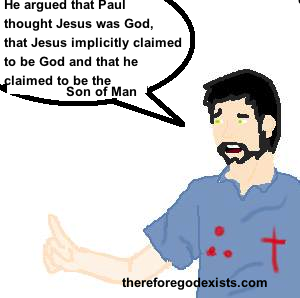 Doctor Bart Ehrman is something like a rock in the shoe of evangelical Christians that is impossible to get out. I take off my shoe and violently labor to shake it out. I reach my hand in, feel around and I do not think it is there. Then I put my shoe back on and the rock is still there. That is not to say that Doctor Ehrman is a pest or that he is annoying (as I intentionally expose myself to his material) but rather than we are confronted by his sophisticated and challenging argumentation. Last night (9/19/2015), he debated (watch here) the rising Christian apologist and historian, Doctor Justin Bass on the topic “Did The Historical Jesus Claim To Be Divine?” This Bart Ehrman Vs Justin Bass debate review will strive to provide a balanced review of the debate, exposing the errors of the debaters, the strengths and shortcomings of the arguments, and circumventing the temptation to preach a sermon about how Doctor Ehrman has the wrong set of presuppositions. Most evangelical critiques of Doctor Ehrman that I have encountered have been established on the basis of that premise.
Doctor Bart Ehrman is something like a rock in the shoe of evangelical Christians that is impossible to get out. I take off my shoe and violently labor to shake it out. I reach my hand in, feel around and I do not think it is there. Then I put my shoe back on and the rock is still there. That is not to say that Doctor Ehrman is a pest or that he is annoying (as I intentionally expose myself to his material) but rather than we are confronted by his sophisticated and challenging argumentation. Last night (9/19/2015), he debated (watch here) the rising Christian apologist and historian, Doctor Justin Bass on the topic “Did The Historical Jesus Claim To Be Divine?” This Bart Ehrman Vs Justin Bass debate review will strive to provide a balanced review of the debate, exposing the errors of the debaters, the strengths and shortcomings of the arguments, and circumventing the temptation to preach a sermon about how Doctor Ehrman has the wrong set of presuppositions. Most evangelical critiques of Doctor Ehrman that I have encountered have been established on the basis of that premise.
 Similarly, I am not keen to say that Doctor Bass took him out to the woodshed just because I am a Christian and would have been rooting for Doctor Bass. For the purpose of an academic debate is not to see your team win. We tend to treat debates as something like a football game. When our team makes a good point, we cheer. When the other team stumbles or is stumped, we are filled with excitement, despite that this particular debater may have just needed a moment to contemplate the point being raised. Debating is often thought of as more of a performance than anything else.
Similarly, I am not keen to say that Doctor Bass took him out to the woodshed just because I am a Christian and would have been rooting for Doctor Bass. For the purpose of an academic debate is not to see your team win. We tend to treat debates as something like a football game. When our team makes a good point, we cheer. When the other team stumbles or is stumped, we are filled with excitement, despite that this particular debater may have just needed a moment to contemplate the point being raised. Debating is often thought of as more of a performance than anything else.
This Bart Ehrman Vs Justin Bass debate review will strive to objectively analyze the data and points that were raised. Accordingly, I will analyze each of the arguments that the debaters raised, and how their opponent interacted with them.
 Bass argues: Paul’s conception of Jesus confirms that he claimed to be God. In his opening presentation, Doctor Bass explicitly said that he had three arguments (which made his presentation very easy to follow), the first of which was how the earliest Christians saw Jesus. He argues that in 1 Corinthians 8:6, we see Paul’s modification of the Deuteronomy 6:4. Deuteronomy 6:4 was the thesis statement of Israel – The Lord our God is one. Paul’s modifier includes Jesus Christ. If Jesus were not God, there would be no warrant to modify Deuteronomy 6:4. Second, Doctor Bass appealed to Philippians 2:5-11, where Paul cites a hymn that says that Jesus existed in the form of God, concluding in the citation of Isaiah, where Paul attributes to Jesus the claim that every knee will bow to God and every tongue confess that he is Lord.
Bass argues: Paul’s conception of Jesus confirms that he claimed to be God. In his opening presentation, Doctor Bass explicitly said that he had three arguments (which made his presentation very easy to follow), the first of which was how the earliest Christians saw Jesus. He argues that in 1 Corinthians 8:6, we see Paul’s modification of the Deuteronomy 6:4. Deuteronomy 6:4 was the thesis statement of Israel – The Lord our God is one. Paul’s modifier includes Jesus Christ. If Jesus were not God, there would be no warrant to modify Deuteronomy 6:4. Second, Doctor Bass appealed to Philippians 2:5-11, where Paul cites a hymn that says that Jesus existed in the form of God, concluding in the citation of Isaiah, where Paul attributes to Jesus the claim that every knee will bow to God and every tongue confess that he is Lord.
 Doctor Ehrman raised a number of objections to this. First, he suggested that this is irrelevant, because the debate was about whether Jesus claimed to be God, not whether Paul thought Jesus was God. In response, Doctor Bass argued that the only viable explanation for Paul’s exalted view of Christ is that Jesus claimed to be God. Doctor Ehrman’s second objection was that Jesus was deified in a typical Pagan style, much like Julius Ceasar or Romulus. He was brought up to Heaven and assumed to be a god. Therefore, the Christians worshipped him as God. Doctor Bass thought that this would stand in contrast with Paul’s caveat to his modification of Deuteronomy 6:4, because, argues Paul, while there are many gods worshipped throughout the world (1 Corinthians 8:5), there is only one God for us, hence excluding any possibility of worshipping other divine figures. Doctor Ehrman argued that 1 Corinthians 8:6 made a clear distinction between God and the Lord Jesus Christ, which would indicate two persons.
Doctor Ehrman raised a number of objections to this. First, he suggested that this is irrelevant, because the debate was about whether Jesus claimed to be God, not whether Paul thought Jesus was God. In response, Doctor Bass argued that the only viable explanation for Paul’s exalted view of Christ is that Jesus claimed to be God. Doctor Ehrman’s second objection was that Jesus was deified in a typical Pagan style, much like Julius Ceasar or Romulus. He was brought up to Heaven and assumed to be a god. Therefore, the Christians worshipped him as God. Doctor Bass thought that this would stand in contrast with Paul’s caveat to his modification of Deuteronomy 6:4, because, argues Paul, while there are many gods worshipped throughout the world (1 Corinthians 8:5), there is only one God for us, hence excluding any possibility of worshipping other divine figures. Doctor Ehrman argued that 1 Corinthians 8:6 made a clear distinction between God and the Lord Jesus Christ, which would indicate two persons.
 Second, Doctor Ehrman rendered the strange accusation of Sabellianism. This is because Doctor Bass used Isaiah 45:23 to establish that Paul regarded Jesus as YHWH. If you think that Jesus is YHWH, argues Doctor Ehrman, you are guilty of Sabellianism. Sabellianism is an ancient Christological heresy that exists today as Oneness Pentecostalism. It says that Jesus is the Father, the Son, and the Holy Spirit. While the Sabellian would certainly say that Jesus is YHWH, merely agreeing that Jesus is YHWH does not classify one as a Sabellian. The classical trinitarian position would affirm that YHWH is eternally present in three persons – the Father, the Son, and the Holy Spirit. However, almost as strange as the objection, Doctor Bass did not call Doctor Ehrman on this charge (as far as I noticed), and so, in the context of the debate, the point was conceded. This Bart Ehrman Vs Justin Bass debate review notes that Doctor Bass provided a robust defense of this argument and Doctor Ehrman, a robust series of counter-arguments.
Second, Doctor Ehrman rendered the strange accusation of Sabellianism. This is because Doctor Bass used Isaiah 45:23 to establish that Paul regarded Jesus as YHWH. If you think that Jesus is YHWH, argues Doctor Ehrman, you are guilty of Sabellianism. Sabellianism is an ancient Christological heresy that exists today as Oneness Pentecostalism. It says that Jesus is the Father, the Son, and the Holy Spirit. While the Sabellian would certainly say that Jesus is YHWH, merely agreeing that Jesus is YHWH does not classify one as a Sabellian. The classical trinitarian position would affirm that YHWH is eternally present in three persons – the Father, the Son, and the Holy Spirit. However, almost as strange as the objection, Doctor Bass did not call Doctor Ehrman on this charge (as far as I noticed), and so, in the context of the debate, the point was conceded. This Bart Ehrman Vs Justin Bass debate review notes that Doctor Bass provided a robust defense of this argument and Doctor Ehrman, a robust series of counter-arguments.
 Bass argues: The implicit claims of Jesus confirm that he claimed to be God. The second argument that Doctor Bass employed was from the implicit claims that Jesus made. The authority that he held and the things that he did establish that he was God. Since Jesus claimed to be the unique Son of God, claimed that in himself, the kingdom of God had come and demonstrated unparalleled authority, we have good grounds for thinking that Jesus was God. But, argues Doctor Ehrman, this authority was chauffeured not by his status as God, but by his status as the Messiah. God granted this authority to Jesus. It was not inherent in Jesus, but was granted to him by God. Similarly, the status as the Son of God was not unique. Solomon was also thought of as the Son of God.
Bass argues: The implicit claims of Jesus confirm that he claimed to be God. The second argument that Doctor Bass employed was from the implicit claims that Jesus made. The authority that he held and the things that he did establish that he was God. Since Jesus claimed to be the unique Son of God, claimed that in himself, the kingdom of God had come and demonstrated unparalleled authority, we have good grounds for thinking that Jesus was God. But, argues Doctor Ehrman, this authority was chauffeured not by his status as God, but by his status as the Messiah. God granted this authority to Jesus. It was not inherent in Jesus, but was granted to him by God. Similarly, the status as the Son of God was not unique. Solomon was also thought of as the Son of God.
 However, Bart’s Blunder seems to be exposed in the way the earliest Christians interpreted the claim to be the Son. When Jesus claimed to be the Son of God, the Pharisees thought that he was claiming to be equal with God (John 5:18). Similarly, in Hebrews 1:10, the Son is identified in a creation psalm that is given to YHWH. In Galatians 4:4, Paul argues that God sent forth his Son. The Son seems to be regarded by the earliest Christians a pre-existent divine figure. However, as far as I can tell, Doctor Bass chose to prioritize his time in such a way as to exclude this point. The Bart Ehrman Vs Justin Bass debate acknowledges that Doctor Ehrman’s point seems to have been left hanging.
However, Bart’s Blunder seems to be exposed in the way the earliest Christians interpreted the claim to be the Son. When Jesus claimed to be the Son of God, the Pharisees thought that he was claiming to be equal with God (John 5:18). Similarly, in Hebrews 1:10, the Son is identified in a creation psalm that is given to YHWH. In Galatians 4:4, Paul argues that God sent forth his Son. The Son seems to be regarded by the earliest Christians a pre-existent divine figure. However, as far as I can tell, Doctor Bass chose to prioritize his time in such a way as to exclude this point. The Bart Ehrman Vs Justin Bass debate acknowledges that Doctor Ehrman’s point seems to have been left hanging.
 Bass argues: Jesus claimed to the Son of Man from Daniel 7. In a stroke of wisdom, Doctor Bass chose to exploit one of Doctor Ehrman’s most defeasible stances. He pointed out that if Jesus claimed to be the Son of Man from the book of Daniel, that would indeed be a claim to be God. When he was being interviewed by the Sanhedrin, the High Priest asked him, “Are you the Messiah, the Son of the Blessed One?” Jesus replied, “I am, and you will see the Son of Man sitting at the right hand of the Mighty One and coming on the clouds of heaven.” (Mark 14:62). Since the Son of Man is the one who received worship from all people, this seems to be a claim to divinity. Doctor Ehrman conceded this point during the cross-examination. Doctor Bass posed the hypothetical question, “If Jesus claimed to be the Son of Man, would that be a claim to be God?” Doctor Ehrman replied, “That’s like saying, ‘if Jesus claimed to be God, would that be claim to be God?” It is a redundancy. Doctor Ehrman seemed to be conceding that if he claimed to be the Son of Man, that would be a claim to be God.
Bass argues: Jesus claimed to the Son of Man from Daniel 7. In a stroke of wisdom, Doctor Bass chose to exploit one of Doctor Ehrman’s most defeasible stances. He pointed out that if Jesus claimed to be the Son of Man from the book of Daniel, that would indeed be a claim to be God. When he was being interviewed by the Sanhedrin, the High Priest asked him, “Are you the Messiah, the Son of the Blessed One?” Jesus replied, “I am, and you will see the Son of Man sitting at the right hand of the Mighty One and coming on the clouds of heaven.” (Mark 14:62). Since the Son of Man is the one who received worship from all people, this seems to be a claim to divinity. Doctor Ehrman conceded this point during the cross-examination. Doctor Bass posed the hypothetical question, “If Jesus claimed to be the Son of Man, would that be a claim to be God?” Doctor Ehrman replied, “That’s like saying, ‘if Jesus claimed to be God, would that be claim to be God?” It is a redundancy. Doctor Ehrman seemed to be conceding that if he claimed to be the Son of Man, that would be a claim to be God.
However, argues Doctor Ehrman, there is no evidence that Jesus claimed to be the Son of Man. He argues that nobody was present for the trial so as to hear what Jesus said and relay it to the Christians. Doctor Bass objects that it is possible for Joseph of Arimathea to have relayed the story. This seemed to amuse Doctor Ehrman, for there is just no evidence to substantiate this historical hypothesis. But the burden of proof would not be on Doctor Bass to establish this point. For Doctor Ehrman is raising the objection that nobody was present who would tell the story. It is possible for Joseph of Arimathea to have told this story.
Further, Doctor Bass argues that the criteria of dissimilarity establishes that Jesus made this claim. The earliest Christians scarcely applied the title Son of Man to Jesus. Doctor Ehrman rather flippantly said, “So you are saying that the earliest Christians believed Jesus was the Son of Man, worshipped him as the Son of Man, revered him as the Son of Man, but never called him the Son of Man?” Doctor Bass answered this question by pointing out that they believed it but never used that title because it is unique to the historical Jesus. Doctor Ehrman then repeats his question and insists upon a yes or no answer (despite that Doctor Bass had already answered his question). This seemed to be an attempt at rhetoric. It was part of a performance, but his insistence on hearing “yes or no” when Doctor Bass had already clearly answered the question was rather shallow. This Bart Ehrman Vs Justin Bass debate review refuses to applaud for Doctor Ehrman’s skill as a debater.
A note about Doctor Ehrman’s opening statement and Doctor Bass’s first rebuttal. In Doctor Ehrman’s opening presentation, he pointed out what historians hope to find in their data. How could we establish that Jesus was God? We would need historical data that would meet certain criteria. Then he argued that the gospels did not meet this criteria because [1] the gospels were written much later than the events that they describe and [2] the gospel of John contradicts the synoptic gospels. This make the four gospels that we possess unreliable as historical data and so when Jesus claims to be God, we simply cannot trust them. Now, in his first rebuttal, Doctor Bass did not directly reply to Doctor Ehrman’s opening presentation. He just reaffirmed and strengthened the arguments that he made in his opening statement. Perhaps Doctor Bass thought that his three arguments were a response to Doctor Ehrman’s opening presentation. Either way, this Bart Ehrman Vs Justin Bass debate review thought it was worth noting.
Ehrman argues: The gospels were the product of generations of story-telling. Doctor Ehrman’s first argument was, as I pointed out, that the gospels were dated much later than the events that they describe. Doctor Ehrman dates the four gospels to about 70 – 90 AD, but, even conceding the earlier dates that Doctor Bass provides (60 – 80 AD), they are still generations after the event that they describe. They come 30 years after the life and death of Jesus. He argues that people remembered the great life that Jesus lived culminating in the claim that he rose from the dead (Doctor Ehrman agrees that the earliest disciples claimed that he rose from the dead), and told stories about him. Those stories were passed down from generation to generation and they changed through the generations. The person who was telling the story would change it so that it would relate to the present situation.
Doctor Bass argued that the gospels were not the product of the lineage of storytelling, because, he argues, the gospel of Mark was taken directly from the apostle Peter, who was a direct disciple of Jesus and an eye-witness of what happened. I assume that Doctor Bass is drawing from Papias, Irenaeus, Justin Martyr, Clement, and a host of other church fathers who testified to this. Doctor Ehrman does not contend with this point. He only argues that even if this were true, it would not matter because eye-witnesses are notoriously unreliable. He eloquently spells out a psychological phenomenon known as flashbulb memory where something traumatic occurs and you remember it vividly for the rest of your life. Psychological data reveals that in flashbulb memory, people often mistake the details of what occurred. But, as Doctor Bass pointed out, this would seem to be a separate argument. For it would disconfirm the idea that the gospels were a product of generations of story-telling. They were drawn directly from Peter. The Bart Ehrman Vs Justin Bass debate review acknowledges that while Doctor Bass did not counter the problem with eye-witnesses and memories, he did successfully refute the idea that the gospels were a product of a long series of generational story-telling by pointing out that the gospel of Mark was drawn from Peter.
Ehrman argues: The synoptic gospels differ from John. Second, Doctor Ehrman argued that since the gospels contradict one another, we cannot rely on them as historical documents. These discrepancies demonstrate that they are a product of generations of story-telling. While he did appeal to discrepancies within the synoptic gospels, the most significant point that he pressed was that there is a difference between the conception of Jesus in the synoptic gospels and the conception of Jesus in the gospel of John. In the gospel of John, Jesus is clearly depicted as God. He says, “Before Abraham was, I am,” (John 8:58) and “Once you’ve seen me, you’ve seen the Father,” (John 14:9). These should be the most significant aspect of the life of Jesus. Why did the other gospel writers miss it?
Doctor Bass contends that they did not miss it. Rather, making room for literary artistry, Doctor Bass thought that the writers of the synoptics constructed their biography of Jesus so as to raise the question, “Who is this man?” Indeed, the disciples are often seen asking this question. There are hints of who he is scattered throughout the gospels, and ultimately culminating in the trial before the Sanhedrin where he claims to be the Son of Man. The difference between the gospel of John and the synoptics is that John is interested in focusing precisely on his claims to divinity. The interest of the synoptics is in building a cumulative case that leads to his claim to divinity. We are asking, “Who is this man?” and then our questions are answered.
The criteria of dissimilarity. Both of these gentlemen appealed to the criteria of dissimilarity several times throughout their presentation. This criteria is met when Jesus says something that the early Christians never appealed to. If he does this, then it can be cataloged as part of the portrait of the historical Jesus. For example, in his book How Jesus Became God, Doctor Ehrman argues that Matthew 25 can be attributed to the historical Jesus because it teaches works-salvation (I dispute that) while the earliest Christians repudiated works-salvations.
However, several times throughout this debate, Doctor Ehrman applied the criteria of dissimilarity in a peculiar manner. He would say things like, “How does Mark 14 pass the criteria of dissimilarity?” He said that the establishment of the Passover Meal does not pass the criteria of dissimilarity. The implication is obvious. Doctor Ehrman is using this criteria to disconfirm that something happened. If Jesus said something that the earliest Christians believed, it cannot be attributed to the historical Jesus. That is not the criteria of dissimilarity. The criteria of dissimilarity serves as a confirmation, not a disconfirmation. One cannot say that because the earliest Christians believed something, that it does not belong to the record of the historical Jesus.
If that were the case, then we would have a picture of Jesus that looked nothing like the Christian tradition that followed. In fact, applying his misuse of the criteria of dissimilarity, we would be left to deny the crucifixion. All of the early Christians believed in the crucifixion. Therefore, it would not pass Doctor Ehrman’s model of the criteria of dissimilarity. However, despite that he consistently made this mistake, Doctor Bass did not call him out on it. The Bart Ehrman Vs Justin Bass debate review provides the balanced criticism that Doctor Ehrman made this obvious mistake, but for some reason, Doctor Bass did not mention it.
Does Doctor Bass have a historical bias? In his cross-examination, Doctor Ehrman asked if there was anything in the gospel record that he thought could not be attributed to the historical Jesus. The way that he posed this question assumed the previous erroneous conception of the criteria of dissimilarity. He asks the two questions (which he thought ran parallel), “Is there anything at all in the gospels that does not pass the criteria? Is there is anything in the gospels that is non-historical?” The implication was that as a committed Christian who believes in inerrancy, one cannot objectively analyze the data. If there is anything that does not pass the criteria of dissimilarity, it follows that it is non-historical. But, again, the crucifixion does not pass the criteria of dissimilarity. That does not make it non-historical.
Doctor Ehrman’s mistake is to think that because you cannot attribute something to the historical Jesus, you thereby are left to deny that Jesus said it. However, Doctor Bass could have easily said that while he cannot prove that Jesus said, “Before Abraham said, I am,” he is not left to concede that Jesus did not say this. He can believe it on a theological basis while acknowledging that there are no historical grounds for believing it. This misuse of the criteria of dissimilarity has led Doctor Ehrman to charge Doctor Bass with bias.
Bart Ehrman Vs Justin Bass debate review. This was a very lively debate and an intense scholarly interaction. There were a few attempts to score debate points, which I found unsavory, but other than that, I thought this was a great discussion. There were several points that were left hanging, but the same can be said of any debate. I am not inclined to declare a winner to this debate. I would rather acknowledge that it was a profitable scholarly exchange.
If you would like to get in on the discussion about this, join my Theology Discussion Group!